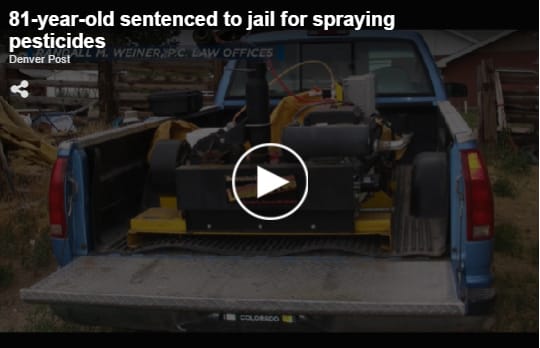The Denver Post
by Bruce Finley
81-year-old James Hopper’s neighbors complained that his mosquito spraying threatened their organic farm
An 81-year-old Colorado rancher who waged war on mosquitoes after his wife nearly died from West Nile virus has launched a last-minute fight against going to jail this week for spraying pesticides that wafted over his neighbors’ organic farm.
“This is such a bogus deal. … It is really ridiculous,” James Hopper said last week on the land in Hotchkiss he has worked for 50 years. “All I’m trying to do is protect us from the mosquitoes.”
State Judge Jeff Herron sentenced Hopper to jail for two days — and fined him $7,500 — ruling that his spraying until 2015 violated a 2012 court order that protected his neighbors, vegetable growers Rosemary Bilchak and Gordon MacAlpine, who suffers from leukemia.
The decision in western Colorado’s North Fork Valley sets a precedent in protecting farmers and sensitive people from pesticides.
“Sprayers can’t allow dangerous pollutants, however small, to migrate onto their neighbors’ land,” said Boulder attorney Randy Weiner, who argued that wafting pesticides are like a physical trespass.
“This unprecedented penalty protects the health of medically sensitive people on their own property and supports Colorado’s expanding organic food economy,” Weiner said.
Pesticide disputes typically are resolved by state agricultural authorities who govern use of chemicals and rarely reach courts. When Minnesota’s Supreme Court in 2012 looked at the issue, judges ruled pesticide drift is not the same as a trespass.
The U.S. Environmental Protection Agency has relied on product labeling to protect people from harmful pesticides.
Colorado Department of Agriculture officials, who in 2011 licensed Hopper to spray pesticides, declined to comment. Colorado Farm Bureau officials also stayed mum.
“This case makes an important and historic contribution,” said Jay Feldman, director of Beyond Pesticides, which since 1981 has advocated for stricter enforcement.
“When you use a chemical and it moves off the target site, you’re violating the label and you’re putting people at risk and also causing economic damage,” Feldman said. “Courts need to intervene to enforce the law and protect people.”
The Colorado dispute began in 2006 after Georgia Hopper was diagnosed with West Nile virus, spread by mosquitoes — one of a growing number of mosquito-borne sicknesses. Her fever shot up higher than 106 degrees, and she was hospitalized for six days.
For years, state-administered Paonia Mosquito Control District sprayers had tried to control mosquitoes that breed in pools, junk, discarded tires and elsewhere across the North Fork Valley. But in 2008, the district switched tactics after Bilchak led a campaign against pesticides.
Growers shifted toward more use of larvicides, injected into pools of water to kill mosquito eggs. Spraying pesticides into the air from a truck at full-grown flying mosquitoes, Bilchak said, “is like shooting a machine gun to hit a fly on the wall.”
Hopper responded by taking a state exam and receiving, in June 2011, a Colorado pesticide applicator’s license. He then obtained a London Fogger, an engine-size device with a funnel that he mounted on the back of a pickup. He filled it with fyfanon, a pesticide containing malathion, and sprayed it out in white puffs to eradicate mosquitoes, court documents show.
But those puffs floated in the air onto the adjacent 20-acre property that Hopper sold in 2005 to Bilchak and MacAlpine, farmers who wanted to expand their organic vegetable production.
MacAlpine suffers from a form of leukemia, court documents show. He and Bilchak began farming to be able to eat healthier, pesticide-free food, dreading pesticide residues that could suppress Mac Alpine’s immune system.
“It’s terrifying — as if you are under assault,” Bilchak said. “We had to be vigilant all the time, listening for the sprayer. We would close the doors and windows. … And it was a threat to our economic development. We’ve never been able to do what we wanted to do.”
They applied for an “organic” certification that attorney Weiner argued would be jeopardized by pesticides. Weiner also presented evidence from cancer doctors that pesticides could hurt MacAlpine’s immune system, pressing his case that unwanted white puffs equate to trespassing.
In 2012, District Court Judge Charles Greenacre ruled that the Hoppers have a right to protect themselves from West Nile virus but that their neighbors have a right not to have their property invaded by other people or things.
Hopper kept spraying. Court records show he continued through August 2015.
Photos taken by Bilchak, clad in long trousers and sleeves and wearing a gas mask, documented wafting puffs.
Judge Herron on Feb. 12 sentenced Hopper to two days in the Delta County jail for contempt of court. Herron called Hopper’s behavior “offensive to the authority and dignity of the Court.” He said the jail sentence “would hopefully inspire Mr. Hopper not to violate the court order in the future.”
Bilchak said this should stop the spraying.
“The fact that we had to prosecute him leaves a sour taste in my mouth,” she said.
Hopper said he plans to go to jail Saturday.
But he and his lawyer late last week filed a legal challenge in the Colorado Court of Appeals, arguing that the court abused its discretion in sentencing him to jail.
He has raised cattle and sheep on his land but now is retired. Georgia Hopper has served on the Hotchkiss Town Council. Mosquitoes that breed in the area bother family members, including a disabled granddaughter.
“She needs to be out in the evenings,” Hopper said.
“I’ve never been a bad guy,” he said. “This is terrible. It’s going to affect spraying everywhere.”


